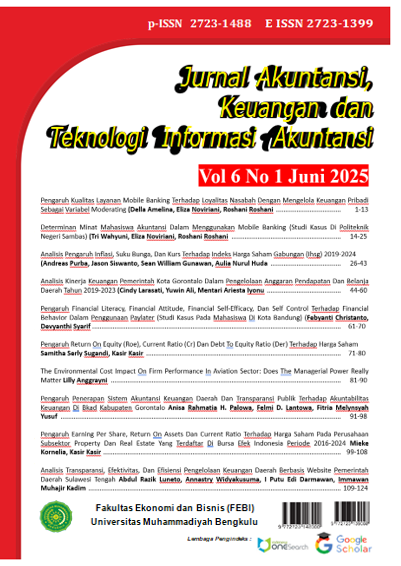THE ENVIRONMENTAL COST IMPACT ON FIRM PERFORMANCE IN AVIATION SECTOR: DOES THE MANAGERIAL POWER REALLY MATTER
DOI:
https://doi.org/10.36085/jakta.v6i1.8468Abstract
This study aims to analyze the effect of environmental costs on company performance with managerial power as a moderating variable in the aviation sector in Indonesia. The research method used is quantitative with a regression approach using time series data from 2016 to 2023. The sample consists of eight airline companies that meet the purposive sampling criteria, namely companies that have published annual reports and sustainability reports for more than 10 years and explicitly disclose environmental costs. The results of the study indicate that environmental costs have a significant effect on company performance. Although managerial power is not significant individually, this variable together with environmental costs simultaneously affects company performance. However, managerial power is not proven to be a moderating variable that strengthens the relationship between environmental costs and company performance. The conclusion of this study emphasizes the importance of environmental cost disclosure and the strategic role of managers in driving corporate sustainability, in line with the Triple Bottom Line theory.
Keywords: Environmental Cost, Firm Performance, Aviation Sector
References
The reference lists use American Psychological Association (APA) 7th edition standards.
Al-Tuwaijri, Sulaiman A., Theodore E. Christensen, and K. E. Hughes. 2004. “The Relations among Environmental Disclosure, Environmental Performance, and Economic Performance: A Simultaneous Equations Approach.” Accounting, Organizations and Society 29(5–6):447–71. doi: 10.1016/S0361-3682(03)00032-1.
Ben Cheikh, Sana, and Mohamed Ali Zarai. 2008. “Impact of Managerial Power and the Personal Characteristics of CEO on the Performance: Case of the Tunisian Companies.” Corporate Ownership and Control 5(3 E SPEC. ISSUE):452–62. doi: 10.22495/cocv5i3c4p5.
Dienes, Dominik, Remmer Sassen, and Jasmin Fischer. 2016. “What Are the Drivers of Sustainability Reporting? A Systematic Review.” Sustainability Accounting, Management and Policy Journal 7(2):154–89. doi: 10.1108/SAMPJ-08-2014-0050.
Dodd, Tracey, and Duygu Yengin. 2021. “Deadlock in Sustainable Aviation Fuels: A Multi-Case Analysis of Agency.” Transportation Research Part D: Transport and Environment 94(April):102799. doi: 10.1016/j.trd.2021.102799.
Elkington, John. 2013. “Enter the Triple Bottom Line.” The Triple Bottom Line: Does It All Add Up 1(1986):1–16. doi: 10.4324/9781849773348.
van Essen, Marc, Jordan Otten, and Edward J. Carberry. 2015. “Assessing Managerial Power Theory: A Meta-Analytic Approach to Understanding the Determinants of CEO Compensation.” Journal of Management 41(1):164–202. doi: 10.1177/0149206311429378.
Jensen, M.C., & Meckling, W. .. 1976. “Theory of The Firm: Manegerial Behaviou, Agency Cost and Ownership Structure.” Journal of Financial and Economics 3(4):305–60.
Jensen, Michael, and William Meckling. 2012. “Theory of the Firm: Managerial Behavior, Agency Costs, and Ownership Structure.” The Economic Nature of the Firm: A Reader, Third Edition 283–303. doi: 10.1017/CBO9780511817410.023.
Joniansyah. 2024. “Penumpang Pesawat Di Bandara Soekarno-Hatta Tembus 26 Juta Orang, Lampaui Jumlah Sebelum Pandemi Covid-19.” Tempo.
Mouta, Cristina, and Raquel Meneses. 2021. “The Impact of CEO Characteristics on Organizational Culture and on the Silo Effect.” Review of Business Management 23(2):207–25. doi: 10.7819/rbgn.v23i2.4100.
Zieba, Malgorzata, and Eljas Johansson. 2022. “Sustainability Reporting in the Airline Industry: Current Literature and Future Research Avenues.” Transportation Research Part D: Transport and Environment 102(December 2021):103133. doi: 10.1016/j.trd.2021.103133.



















